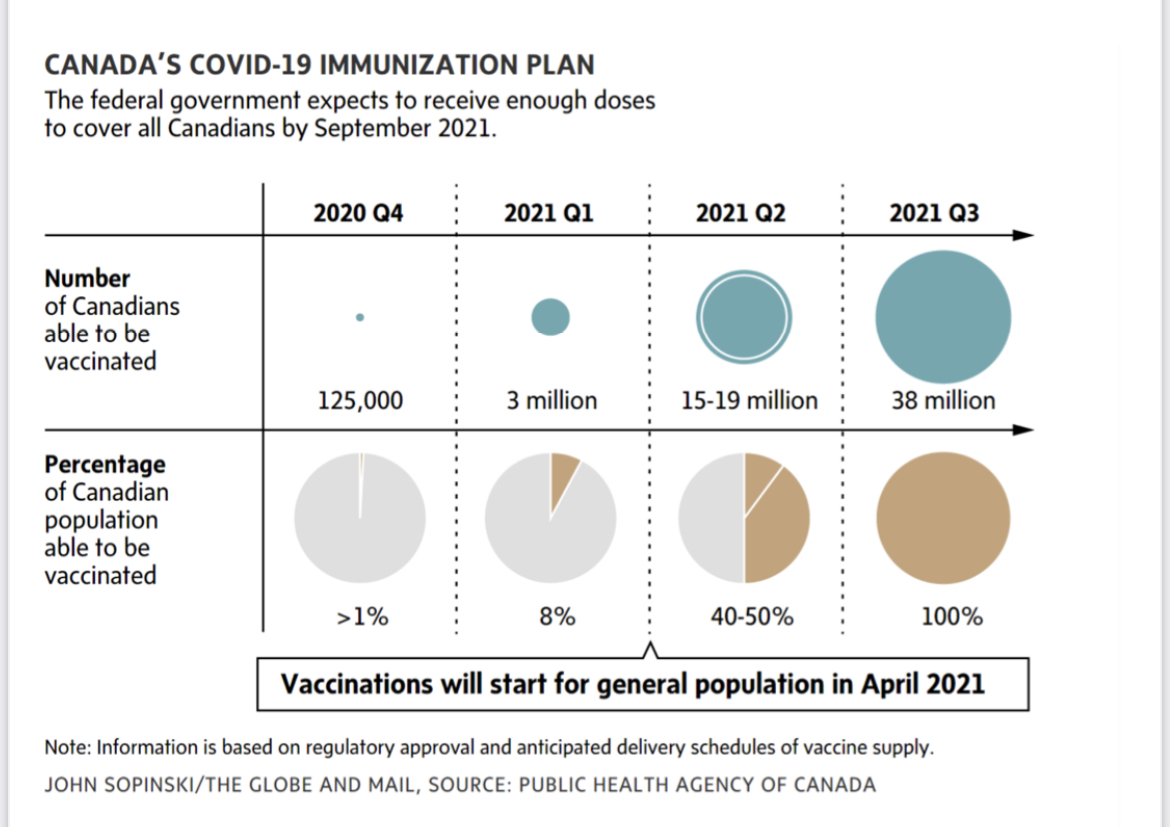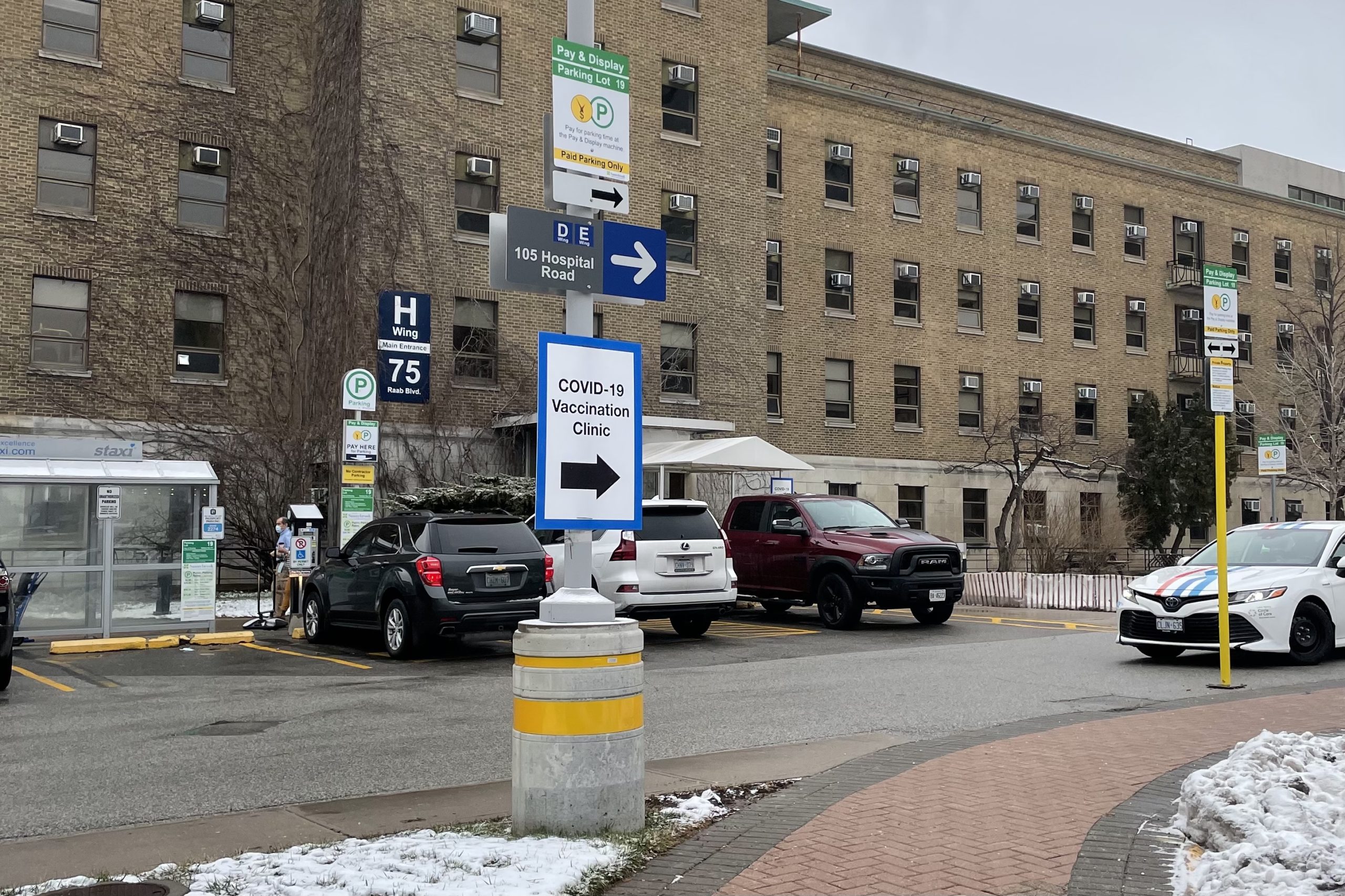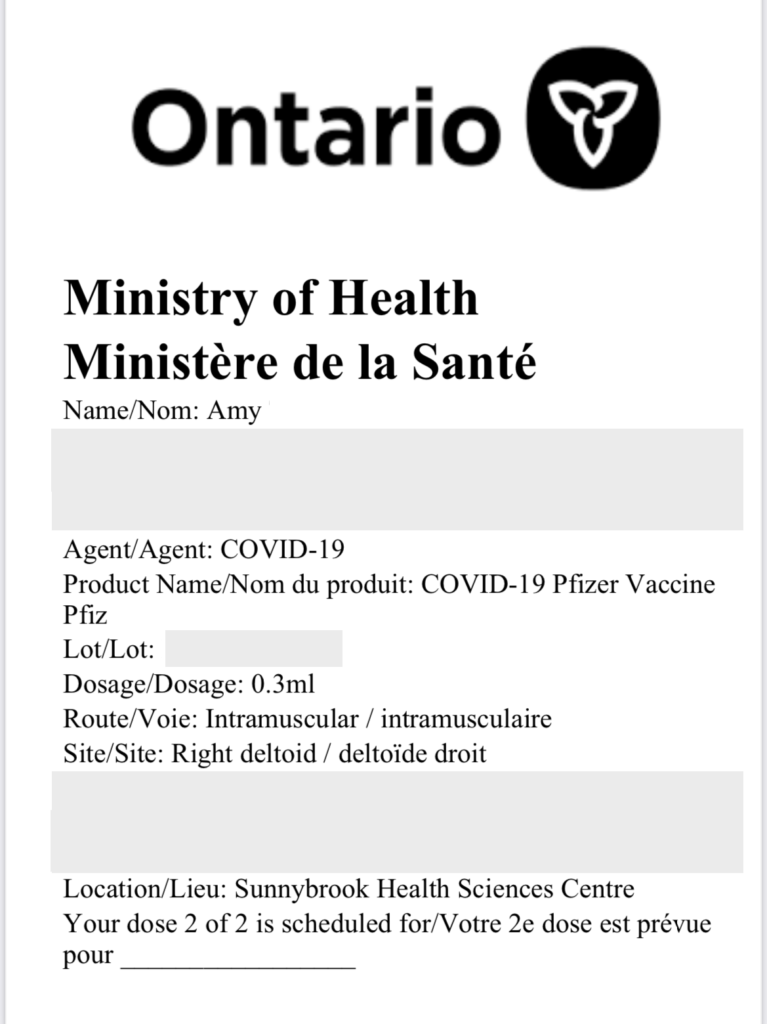This past week, I was fortunate enough to receive my first dose of the Pfizer-BioNTech vaccine.
Getting it this early was a bit unexpected, but when I recently offered to help out in a high-risk setting, the vaccine was offered as an extra layer of protection.
When I got my email notification of my vaccination date and time, I couldn’t help but feel a little excited. There is so much hinging on the success of this vaccine; it could mark the beginning of the end of what has been a very long pandemic and the gradual return to life – and travel – as we once knew it.
With that excitement, there was also what I would call a healthy dose of nervousness, seeing that this is a new vaccine and we have no long-term data on it. But it’s a brave new world out there, and sometimes we just need to take a leap of faith, which is what I did.
The Vaccine
The Pfizer-BioNTech vaccine is one of the two vaccines approved for use in Canada at this time. Moderna is the other.
Both are mRNA vaccines. mRNA is the genetic material that contains a set of instructions for cells to make proteins. In the case of both these vaccines, the mRNA codes for the spike protein, a component normally found on the SARS-CoV-2 virus’s surface.
Once given the vaccine, the mRNA will enter our cells and start creating and displaying this spike protein on our cells’ surface. Our immune system will then recognize the protein as foreign and begin making antibodies against it.
It is actually a pretty nifty technology, and although it’s new, it has been studied in oncology for quite a few years. Two doses of the Pfizer-BioNTech vaccine, given 21 days apart, are required for 95% efficacy. A single dose will elicit only 52% efficacy, and efficacy is seen within the first 12–14 days.
The Rollout
The government is administering the vaccine in three stages, with the most vulnerable or high-risk populations being prioritized to receive it first, and the general public receiving it in the third and final stage. For more detailed information on getting the COVID-19 vaccine in Ontario, visit this page.
The chart below shows the planned rollout targets, although given the slow rollout we’ve seen so far, the timeline may be delayed. Even though there has been prioritizing of groups within hospitals and other different sectors, some hospitals have opened it up to all their staff to increase vaccination rates.

My Vaccination Process
Because the Pfizer-BioNTech vaccine currently needs to be stored at –60oC to –80oC, it is only being offered at select hospitals at this time. I was directed to go to Sunnybrook Health Sciences Centre in Toronto to receive mine.
My emailed appointment notification came with a unique identifier code and a few attachments, including a consent form and detailed information regarding the vaccine.
My appointment was at 9:50am, and I was advised to arrive no more than 10 minutes prior. There was plenty of signage outside the hospital to direct me to the vaccination clinic.

Walking up to the entrance of the clinic, I noticed that there was no line up. The staff stationed at the door screened me for COVID-19 symptoms and exposures, asked for my name, checked me off a list, and gave me a date-stamped sticker that said “PASS”. I was directed to go into a hallway that led to an auditorium.
Along the hallway were several chairs spaced apart for social distancing. Someone came around and verified my name on another checklist, handed me a clipboard with a consent form (in case it wasn’t completed at home), and kindly asked that I attach my health card to it.
I moved down the chairs until I reached the entrance to the auditorium, where I was greeted by yet another individual. This person entered my demographic and health card information into his laptop and directed me to a vaccination station.
Looking around the auditorium, tables were set up on one side into six vaccination stations. On the other side were maybe a dozen chairs spaced out.

The healthcare worker at my station confirmed my identity and information, gave me some basic information about the vaccine, ensured I had no contraindications to getting it, and then obtained my consent. She then grabbed a pre-filled syringe; I rolled up my sleeve and was jabbed.
I was then given a numbered ticket and directed to take a seat in the auditorium and stay for a 15-minute observation period. At the end of 15 minutes, a staff member called out my number. She asked if I was experiencing any side effects. When I reported “no”, I was given an envelope that contained the appointment information for my second dose, as well as the record of my immunization.
By the time I had walked back to my car, I had received two emails, one from Sunnybrook with details of my second vaccination appointment and the other from the Ministry of Health with a digital record of my immunization.

Post-Vaccination Side Effects
One of the most common concerns about medications and vaccines are the side effects. I was interested to see what acute side effects, if any, I would experience.
There have been some rare reports of allergic reactions and anaphylaxis, but the more common side effects of the Pfizer-BioNTech vaccine are listed below.
- Very common side effects (may affect more than 1 in 10 people):
- Pain at injection site
- Fatigue
- Headache
- Muscle pain
- Chills
- Joint pain
- Fever
- Diarrhea
- Uncommon side effects (may affect more than 1 in 100 people):
- Axillary swelling and tenderness (enlarged lymph nodes)
Going home, I didn’t feel any different. It wasn’t until 10–12 hours later that I started noticing a bit of soreness over the injection site, very similar to what you would feel with the flu shot or if you had a large bruise over your arm. This soreness lasted for about a day, but happy to say, that was the full extent of it.
What Are the Implications for Travel?
With my vaccine, I wish I could throw away my mask, start seeing my family and friends again, and resume life where it left off almost a year ago. Unfortunately, that’s not going to change any time soon.
First of all, full efficacy is contingent on receiving the second dose. Second, even though the vaccine is very effective in preventing disease in those vaccinated, we don’t know if it actually lowers their risk of spreading the virus to others should they be exposed to it.
Third, we still don’t know how long immunity from the vaccine lasts for, and fourth, whether it will be effective against new mutations in the virus. Given these reasons, all the current public health measures must still apply at this time.
What do the vaccines mean for travel in the future? Will a vaccine certificate grant entry into an otherwise restricted country? Will it allow exemption from or shorten quarantine requirements? Will it affect travel insurance coverage?
The reality is that it’s still too early for definitive answers to these questions at this stage. I suspect some of us will still feel anxious about travelling even after vaccination, but many of us will be happy to resume travelling once mass vaccinations begin.
Meanwhile, those who travel with young children will also have to wait a little longer for a paediatric indication for the vaccines.
Regardless of how things play out in terms of changes in travel policy based on vaccination, I’ll take comfort in knowing that I at least have an extra layer of protection if I travel in 2021.
Conclusion
Vaccination is undoubtedly an important step in our fight against COVID-19. One could say it’s our best “shot” at beating it at this point.
I’m excited to have received my first dose of the Pfizer-BioNTech vaccine. Overall, I was quite impressed with how streamlined and organized the vaccination process was (they even validated my parking!), but I was disappointed to see how few people were being immunized at one time. This is definitely something to be addressed as we step up our mass vaccinations in Canada.
Vaccine hesitancy is another issue. To effectively achieve herd immunity, we need at least 70% of the population vaccinated and immune, so we have a long way to go. If you’re feeling unsure about the vaccine, I would encourage you to read up on the vaccines, so that when your opportunity to vaccinate comes, you’ll be ready to make an informed decision.
That wraps up my experience with the COVID-19 vaccine. What are your thoughts on the vaccine and how it will affect travel? Do you intend on getting it when it’s available to you? Let me know in the comments below.




















A great resource for more information on the vaccines:
https://www.nejm.org/covid-vaccine
It’s too slow for the progress now that government should get this organised much faster than present speed.
Congrats for being chipped 😛 jokes aside, I wish I was in Toronto and could get vaccinated by 2021 or even latest 2022 if hickups happens.
In SK they are so slow if they keep it up, vaccines “might” be all done by 2030….
Given the current state of the rollout, I believe Q3 is overly optimistic. Let’s hope they can make up for lost time.
I like how well descriptive and organised this article is. I appreciate this flow chart style writing.
I have been offered to receive a shot in the coming weeks but for the time being I have declined. As you mentioned Amy, it is too soon to know whether once being vaccinated you will be granted entry to an otherwise restricted country etc. For the time being I rather have my dose go to someone that wants that extra “assurance/layer of protection” asap. I have no issue continuing to wear masks for the foreseeable future. Once more information comes out e.g. if countries begin to accept proof of a vaccination as an alternative to PCR tests/quarantine, I’ll circle back and receive my doses.
I cannot wait until my name comes up for the vaccine. I will have absolutely no hesitancy in taking the shot. I do not see why people are so wary. The timeline for the development for the H1N1 vaccine almost mirrors that of covid19 and I do not recall any reports of side effects or deaths.
There was an increased prevalence of narcolepsy following the H1N1 vaccination in Europe.
https://www.who.int/vaccine_safety/committee/topics/influenza/pandemic/h1n1_safety_assessing/narcolepsy_statement/en/
H1N1 vaccination only contributed to type 1 narcolepsy in a subset of patients with a very uncommon, for Canada, HLA subtype. Being infected with H1N1 was a stronger driver of narcolepsy than getting the vaccine. I treat patients with narcolepsy in my spare time.
Received COVID vaccine booster dose yesterday and still standing. And not sleepy.
As much as I’d love to get away and see our families both my wife and I won’t be travelling until they’re immunized as well.
Retweet. Retweet a hundred times.